Key takeaways:
- Agile methodology emphasizes flexibility, customer collaboration, and iterative development to drive better project outcomes.
- Workshops enhance team dynamics, foster adaptability, and build communication skills through hands-on experiences and role-playing exercises.
- Key lessons learned include the significance of feedback, the importance of trust within teams, and the value of celebrating small wins to boost morale and motivation.
- Personal growth experiences stress the power of active listening and the mindset of continuous learning from failures as essential for both individual and team development.
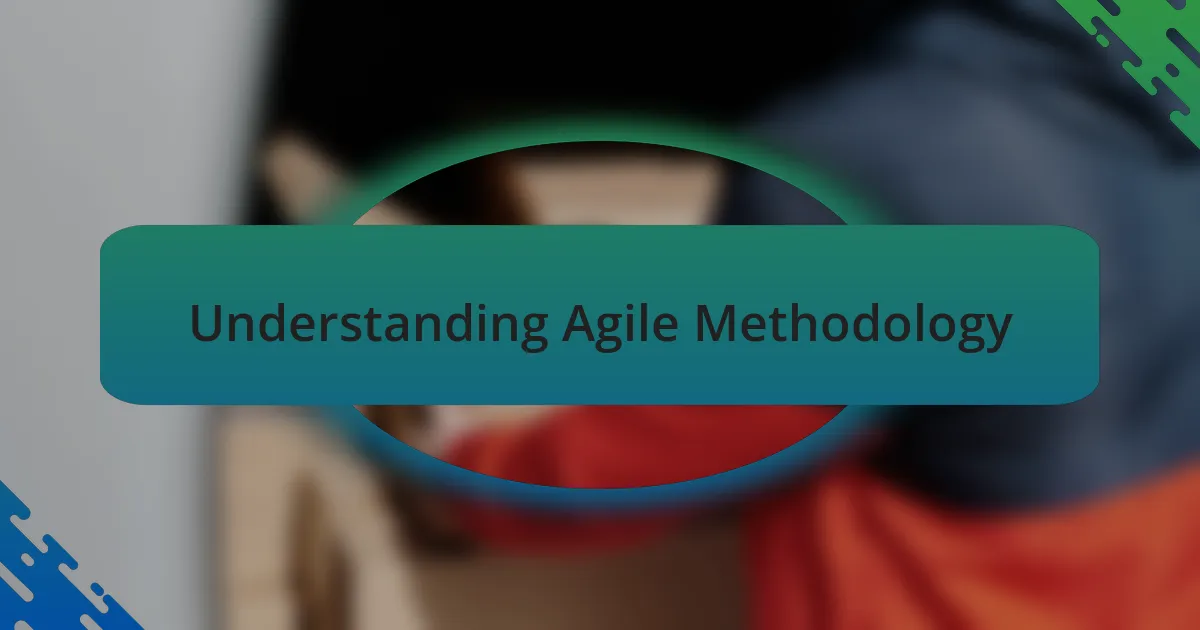
Understanding Agile Methodology
Agile methodology is all about flexibility and responding to change. I recall a project where we faced a major shift in client requirements just weeks before the deadline. Instead of panicking, we embraced Agile principles, breaking down the tasks into manageable sprints. It was fascinating to see how collaboration and regular updates transformed our approach, leading to a final product that not only met but exceeded expectations.
At its core, Agile emphasizes customer collaboration over rigid contract negotiations. I remember a workshop discussing how often our assumptions about customer needs can be flawed. It sparked a realization: why not involve customers throughout the development process? This has led me to ask myself—how often do we really listen to our users? Engaging them early and regularly can unveil invaluable insights and lead to better outcomes.
The iterative nature of Agile fosters continuous improvement. During a recent project, we conducted retrospectives after each sprint. I experienced firsthand how creating a safe space for team members to voice their thoughts resulted in actionable takeaways that strengthened our workflow. This practice not only enhanced our efficiency but also built a sense of ownership and accountability within the team, driving us toward excellence.
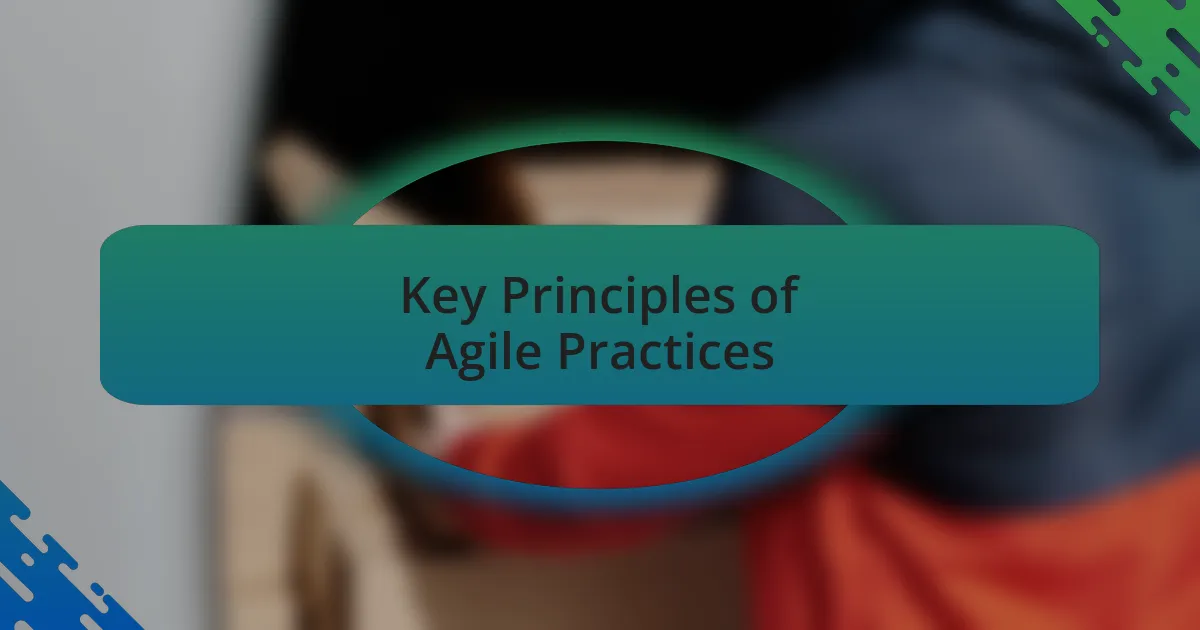
Key Principles of Agile Practices
Agile practices pivot around the principle of embracing change, which I’ve learned is crucial in software development. One time, in a workshop, we simulated a project where requirements changed abruptly. It was enlightening to see how, when we shifted our mindset to view changes as opportunities rather than obstacles, our team’s creativity flourished, resulting in innovative solutions we hadn’t initially considered. Have you ever noticed how resistance to change can stifle progress?
Another key principle is the importance of cross-functional teams. During a collaboration exercise, I felt the synergy that comes from blending diverse skills and perspectives. When designers, developers, and testers work together, the end product becomes richer and more aligned with user needs. Have you experienced that “aha!” moment when a team member offers a fresh viewpoint that elevates the whole project?
Then there’s the emphasis on delivering working software at regular intervals. I vividly remember the thrill of demos after each sprint, where we showcased tangible features to stakeholders. It transformed the feedback loop into a collaborative process rather than a final review, allowing us to pivot quickly based on real user input. This made me ask—are we really building what our users want, or are we just meeting deadlines?
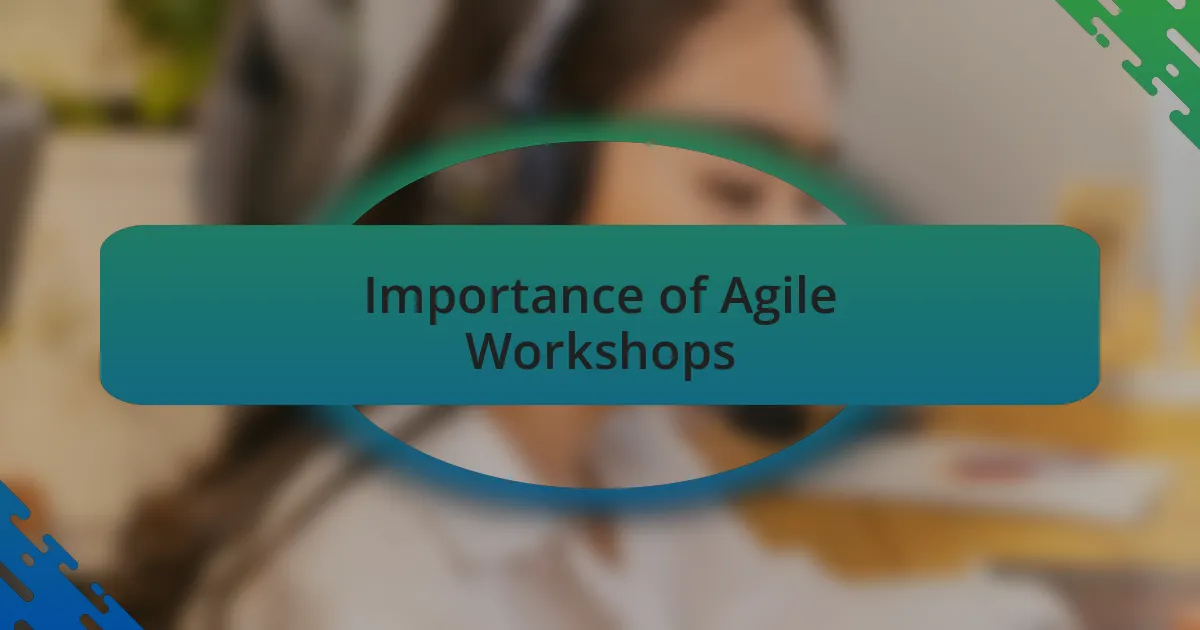
Importance of Agile Workshops
Agile workshops hold immense value in fostering a culture of adaptability. I recall a particularly engaging session where we dissected past projects and identified how rigidity in processes often led to missed opportunities. This collective reflection made me question—how often do we cling to outdated practices at the cost of innovation?
The workshops are also crucial for building strong team dynamics. I once participated in a role-playing exercise that highlighted the importance of empathy in our work. By stepping into each other’s shoes, we developed a deeper understanding of our roles and responsibilities, fostering trust within the team. Isn’t it fascinating how a simple shift in perspective can enhance collaboration?
Moreover, the hands-on experience in these workshops reinforces theoretical learning, making it tangible and relatable. During one such session, we practiced iterative development, which allowed me to see firsthand the effectiveness of smaller, incremental changes. That lightbulb moment made me think—could this approach be the secret to overcoming the challenges we face in our projects?
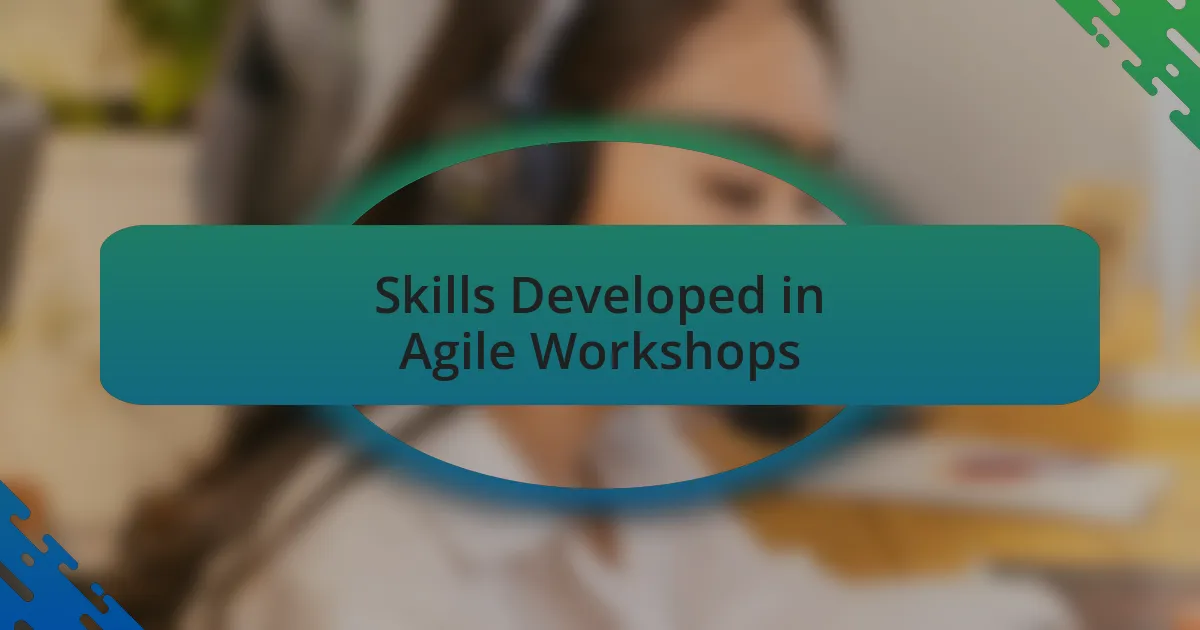
Skills Developed in Agile Workshops
Engaging in Agile workshops has significantly sharpened my communication skills. I vividly remember a session that focused on facilitating team stand-ups. I initially struggled with being concise, often overexplaining issues. This experience taught me the power of brevity—delivering crucial information quickly not only respects everyone’s time but also fosters clearer dialogue. Have you ever found yourself stuck in a long-winded meeting, wishing someone would get to the point?
Another key skill developed through these workshops is adaptability. There was a moment when our group was split into teams to tackle a sudden project pivot. I recall feeling a sense of panic at first, but as we delved into brainstorming alternative strategies, I realized how quickly we could pivot our mindset and approach. This adaptability has become an invaluable asset, preparing me for unexpected challenges in the rapidly changing tech landscape. How often do we find ourselves needing to adjust our strategies on the fly?
Lastly, problem-solving abilities flourish in this collaborative environment. I participated in a workshop that involved simulating project setbacks and working through them as a team. The dynamic discussions that ensued sparked creative solutions I hadn’t considered before. It reminded me of the importance of leveraging diverse perspectives—after all, isn’t teamwork about harnessing our collective intelligence to conquer obstacles?
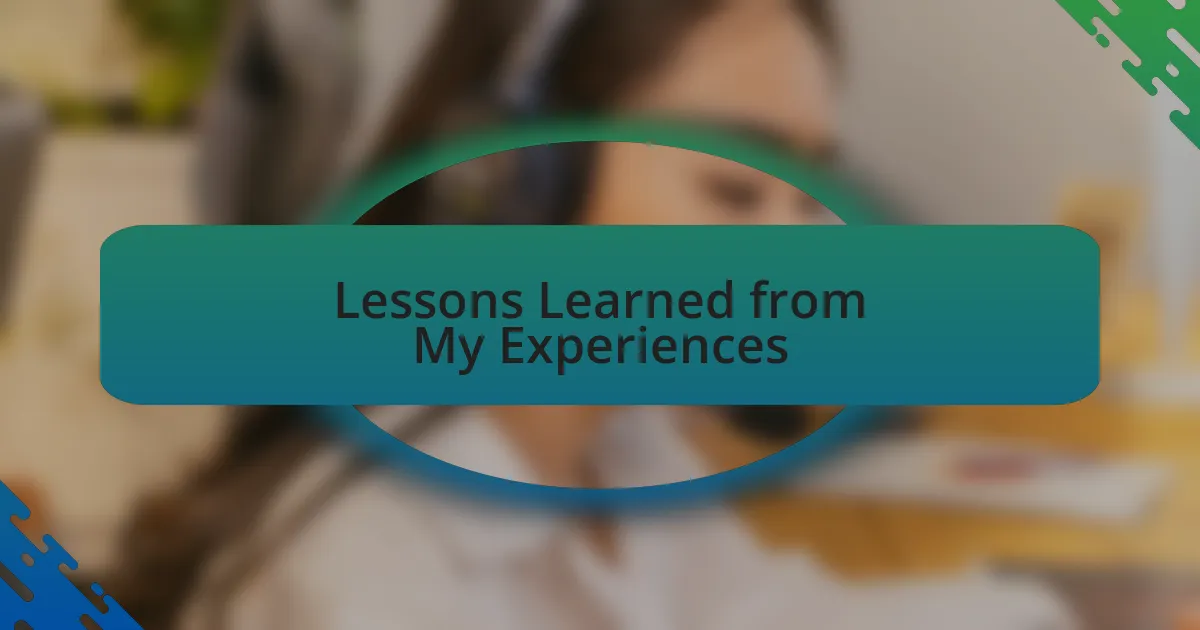
Lessons Learned from My Experiences
One of the most profound lessons I took away from Agile workshops is the significance of feedback. During a particular session, we engaged in a peer review exercise that felt intimidating at first. Hearing others dissect my work, I initially bristled at their critiques, but as I listened more intently, I realized that constructive feedback is a gift. It opened my eyes to blind spots I had been overlooking. How often do we miss out on opportunities for growth simply because we fear judgment?
Another crucial insight was the importance of trust within a team. I recall a moment when our group was asked to share personal challenges related to our projects. At first, I hesitated, wondering if my vulnerabilities would be seen as weaknesses. However, as others opened up, it created a safe space that encouraged honesty and collaboration. This experience taught me that fostering trust can transform team dynamics. Have you ever noticed how a little vulnerability can lead to deeper connections?
Finally, I learned the value of celebrating small wins. There was a time when our team achieved a minor milestone after a particularly strenuous sprint. Instead of rushing to the next task, we took a moment to recognize our hard work. This simple act of celebration cultivated a sense of accomplishment and motivation. It reminded me that progress isn’t always about the finish line—sometimes it’s about appreciating the journey along the way. Do we often pause to reflect on our achievements, however small, in our fast-paced environment?
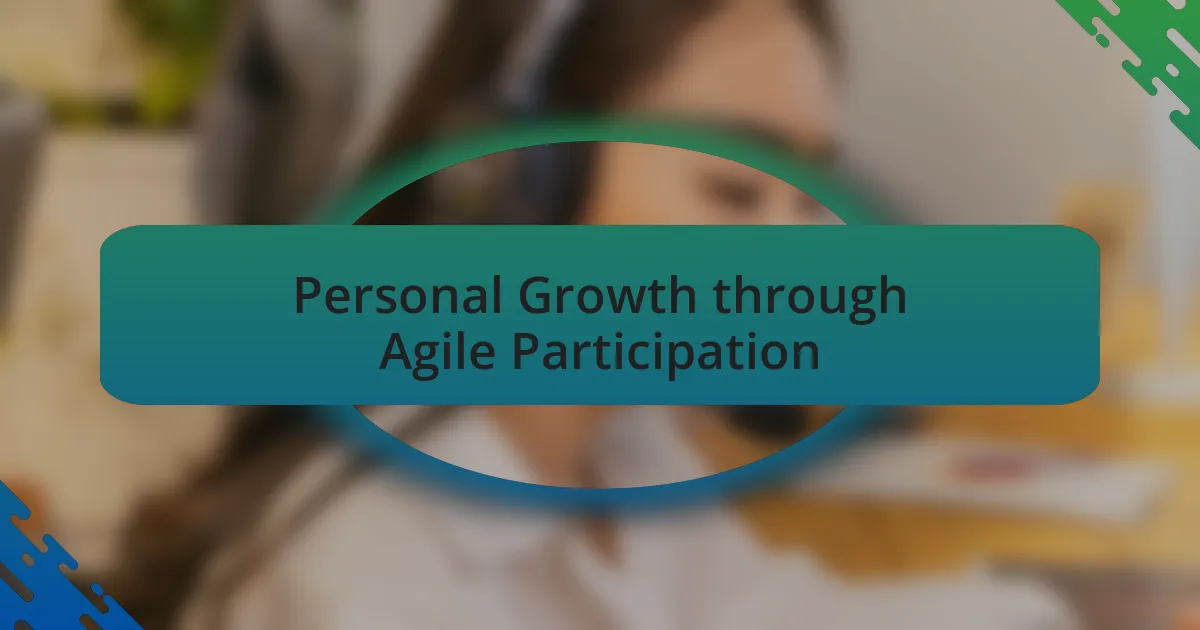
Personal Growth through Agile Participation
Participating in Agile workshops has profoundly deepened my understanding of adaptability. I can recall a moment during a role-playing exercise where our team had to pivot quickly due to an unexpected twist in the scenario. Initially, I felt overwhelmed by the sudden shift, but as I embraced the need to adjust, I discovered a new level of creativity and resilience within myself. Have you ever found that your ability to adapt can unlock hidden potential?
Another key aspect of personal growth that emerged for me was the practice of active listening. In one workshop, we were tasked with identifying each other’s strengths. As I intently focused on my colleagues’ insights and ideas, I realized how often I had been preoccupied with my own thoughts. This shift helped me not only appreciate my team’s talents but also facilitated a more inclusive environment where everyone felt valued. Isn’t it remarkable how listening can transform our perspectives?
Engaging in these workshops also taught me the power of continuous learning. I vividly remember a particular session when we discussed the concept of ‘fail fast, learn faster.’ Sharing my own past failures was daunting, but the support from my peers made it an enlightening experience. This embraced ethos of learning from mistakes reminded me that every setback is a stepping stone to greater wisdom. Don’t you think understanding our failures is essential for personal and professional growth?